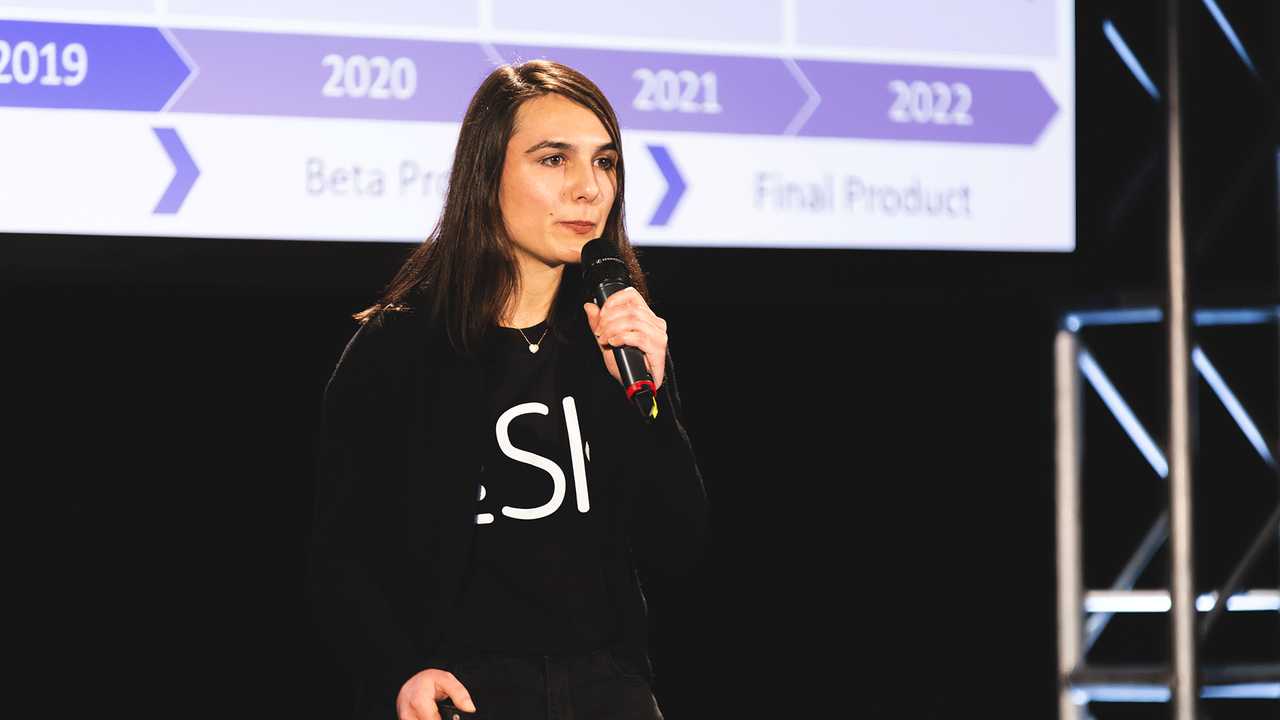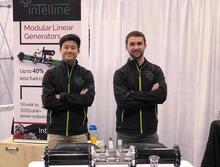
Waterloo entrepreneurs turn heads at Y Combinator Demo Day
Four companies affiliated with the University of Waterloo pitched to investors at the online-only event

Four companies affiliated with the University of Waterloo pitched to investors at the online-only event
By University RelationsWhen investors logged in to Y Combinator’s virtual summer 2020 Demo Day, they got to see Waterloo entrepreneurship in action. Four companies with ties to Velocity and the University of Waterloo took part in the event, which brought together a class of 198 of founders from 26 different countries.
“To have four founders with ties to our campus in a group from across the globe is a testament to the strength of our entrepreneurs and the tools and supports we’re able to provide here at Waterloo,” says Adrien Côte, executive director of Velocity. “Whether companies are getting their start here on campus or coming to us for tools and resources as they develop, we’re proud to be able to offer the right supports at each stage of the journey.”
Meet the companies who made Waterloo proud on Demo Day.
 A friend with a car is a hot commodity on a university campus, as students navigate getting everything from groceries to furniture home without a hassle. So, after spending the summer working in shipping and receiving to pay for school and recognizing the business potential of having a set of wheels, Biology student Jaden Pereira put rubber to the road and started TyltGO, delivering goods from local retailers to his peers around Kitchener-Waterloo.
A friend with a car is a hot commodity on a university campus, as students navigate getting everything from groceries to furniture home without a hassle. So, after spending the summer working in shipping and receiving to pay for school and recognizing the business potential of having a set of wheels, Biology student Jaden Pereira put rubber to the road and started TyltGO, delivering goods from local retailers to his peers around Kitchener-Waterloo.
Business was brisk, and when the time came to expand, Pereira found his match in Management Engineering student Aaron Paul. TyltGO also got a helping hand in the form of the Enterprise Co-op (E Co-op), a made-at-Waterloo program that allows students to start their business while earning credit.
“[Enterprise Co-op] played a huge role in me coming on full-time, to giving that full-time dedication towards TyltGO. And that’s what allowed us to get the traction to grow and grow,” says Paul. “By the time we submitted our Y Combinator application and interview, we had that traction to back us and say ‘we are an investable company and we’re going to make it.’”
The pair shifted in October 2019 from a consumer-facing model to a business-to-business model. TyltGO manages the last-mile delivery logistics for brick-and-mortar retailers and e-commerce brands, offering same-day delivery under their own brand name, including live-tracking and status updates. They’re also creating collaborative delivery networks to allow retailers to share a delivery route, effectively lowering the cost for both businesses.
Now looking to expand their team to meet the growing interest from potential customers, Pereira credits Waterloo with giving TyltGO the tools and opportunity to take flight.
“E Co-op gave us that opportunity, four months to really give it your all and see what happens. Without that I don’t think we’d be where we are right now.”
 Life Sciences Key (LSK) Technologies is no stranger to the art of the pitch. In 2020 alone, the medical device company won the grand prize at the TiEQuest Business Venture Competition, took home two prizes from the RBC Innovation and Entrepreneurship Early Stage Competition and received a $100,000 investment from both Velocity’s HealthTech and General funds, the maximum amount for a Velocity Fund recipient.
Life Sciences Key (LSK) Technologies is no stranger to the art of the pitch. In 2020 alone, the medical device company won the grand prize at the TiEQuest Business Venture Competition, took home two prizes from the RBC Innovation and Entrepreneurship Early Stage Competition and received a $100,000 investment from both Velocity’s HealthTech and General funds, the maximum amount for a Velocity Fund recipient.
It’s easy to understand the excitement. Their “lab in a box” device, called PLUM, is a portable diagnostic tool that can test for hundreds of infectious diseases, including COVID-19. Designed to be easy-to-use and cost effective, the tool allows for testing right at the point of collection. Founded by Seray Çiçek and Yuxiu (Livia) Guo and their professor Keith Pardee at the University of Toronto, LSK’s devices have caught the attention of the federal government too. As efforts to combat the global coronavirus pandemic ramped up earlier this year, Pardee’s lab received $1 million to fund research, which will include field use of the PLUM device.
The Toronto-based company has found a new home in Velocity. Çiçek credits the support they’ve received since joining the community with helping push them to the next level. And she wasn’t surprised to see strong representation from other Velocity companies at Demo Day.
“Velocity encourages people to challenge themselves and puts them into a position where they should be feeling comfortable with their idea,” says Çiçek. “And there’s also resilience in the community, so if you don’t get what you want the first time, you’ll keep applying. So I’m not that surprised, but I acknowledge that it’s a high success rate.”
LSK continues to work towards field testing, to apply what they learn and commercialize PLUM. Çiçek says they are eager to ramp up support for communities and are hoping to commercialize and be in-market within a year, thanks in part to the helping hand from Velocity.
“The Velocity community has offered us lab space and office space, on top of the on-site direct mentorship. It’s a hub that contains everything, and we have access to our advisors whenever we have a question. It’s been quite valuable to us.”
 Taylor Cooney (GBDA ’16) has always had an interest in entrepreneurship and leveraged the Velocity Residence at Waterloo to build the skills he knew he would need. But it was an unexpected move that inspired OpenUnit, the business he co-founded with friend Lucas Playford in 2019. When faced with the challenge of moving and storing his belongings on just a few days’ notice, Cooney realized that the online presence of smaller, independently-owned self-storage companies — what he calls the “mom and pop facilities” that make up around 74 per cent of businesses in the industry — didn’t line up with consumer preferences.
Taylor Cooney (GBDA ’16) has always had an interest in entrepreneurship and leveraged the Velocity Residence at Waterloo to build the skills he knew he would need. But it was an unexpected move that inspired OpenUnit, the business he co-founded with friend Lucas Playford in 2019. When faced with the challenge of moving and storing his belongings on just a few days’ notice, Cooney realized that the online presence of smaller, independently-owned self-storage companies — what he calls the “mom and pop facilities” that make up around 74 per cent of businesses in the industry — didn’t line up with consumer preferences.
“The online shopper may have 13 or 14 tabs open when looking to make a purchasing decision. If you got to a website that doesn’t have pricing information, doesn’t have inventory, doesn’t have a button to rent online and they’re just a phone number, you’re going to close that one down and go to another website. And you’ll end up at one of the big companies,” explains Cooney, adding that these small business owners often can’t afford the off-the-shelf software needed to compete online.
OpenUnit is helping these operators by providing them with an all-in-one platform designed to boost their online presence, plus a reservation system, merchant solutions, support for legal agreements and insurance, and management software. And customers with storage needs can use their website to compare availability and prices for facilities near them.
With COVID-19 increasing the demands for storage rentals and the kinds of contactless and online options that OpenUnit can offer out-of-the-box, Cooney and Playford are taking advantage of a full schedule of meetings with potential investors and customers.
“The industry had to rapidly adopt contactless move-ins to keep their frontline staff and renters safe,” says Cooney. “Being built right out-of-the-box to accommodate this new process, like accepting eSignatures for rental agreements and allowing customers managing their own information and payment methods, makes us attractive to operators when we are speaking with them.”
 Intelline was born out of the University of Waterloo Problem Lab, a one-of-a-kind resource that challenges students to create ventures of significant economic and social consequences. By focusing on the problem and not the solution, the Problem Lab sets the stage for truly innovative ideas. Back in 2017, co-founders Kyle Faller and Chris Mathew (BMath ’20) won the first-place prize at the Problem Pitch Competition, earning $4,000 to fund research and development to help address the prohibitive cost of cryocooling methods.
Intelline was born out of the University of Waterloo Problem Lab, a one-of-a-kind resource that challenges students to create ventures of significant economic and social consequences. By focusing on the problem and not the solution, the Problem Lab sets the stage for truly innovative ideas. Back in 2017, co-founders Kyle Faller and Chris Mathew (BMath ’20) won the first-place prize at the Problem Pitch Competition, earning $4,000 to fund research and development to help address the prohibitive cost of cryocooling methods.
Their next stop for Intelline was the 2018 Velocity Fund Finals, where they picked up an extra $10,000 to help fund the hardware they needed to create a more affordable cryocooling system for commercial use. As they continued testing, their designs have evolved into a linear generator technology that can save fuel and significantly reduce greenhouse gas emissions.
Intelline’s diesel generators use 40 per cent less fuel and are propelling their business success. They showed off their technology to the mining industry at the annual Prospectors & Developers Association of Canada conference in March 2020, generating considerable interest from customers looking to save on costs. They project that the technology can save a mine operation $35 million a year.
The Intelline Modular Linear Generator (MLG) is modular, meaning that the units can be scaled to add generating capacity and grow with a business. The MLG is cost-competitive and more efficient, and it’s eliminated many of the moving parts found in traditional engines, resulting in a fivefold extension of the lifetime between rebuilds.
“Our generators are truly a direct replacement for traditional generators, making it easy for customers to make the switch to more efficient technology without having to invest heavily in new infrastructure, says Faller. “We want them to start using less diesel ASAP, but our technology is also designed to work with other fuel types without having to change the hardware."
Next year, the plan is to test a hybrid generator application, then in a rail vehicle as the team explores the possible applications of the MLG in a world where fleets traditional diesel and natural gas engines will require new, modern replacements.
“We imagine a future where mining operations, remote communities, ships, trains, and construction equipment are all powered by Intelline generators, and our products can become a driving force in the transition to sustainable zero-carbon fuels," says Faller.

Read more
Pharmacist and entrepreneur Rui Su creates MedMe Health to enable pharmacists to deliver maximum clinical value

Read more
Concept, Velocity’s pre-incubator program, announce their winners of the $5K Grant Competition and the Pandemic Challenge Fund

Read more
Learning from others to build success for the future
The University of Waterloo acknowledges that much of our work takes place on the traditional territory of the Neutral, Anishinaabeg, and Haudenosaunee peoples. Our main campus is situated on the Haldimand Tract, the land granted to the Six Nations that includes six miles on each side of the Grand River. Our active work toward reconciliation takes place across our campuses through research, learning, teaching, and community building, and is co-ordinated within the Office of Indigenous Relations.